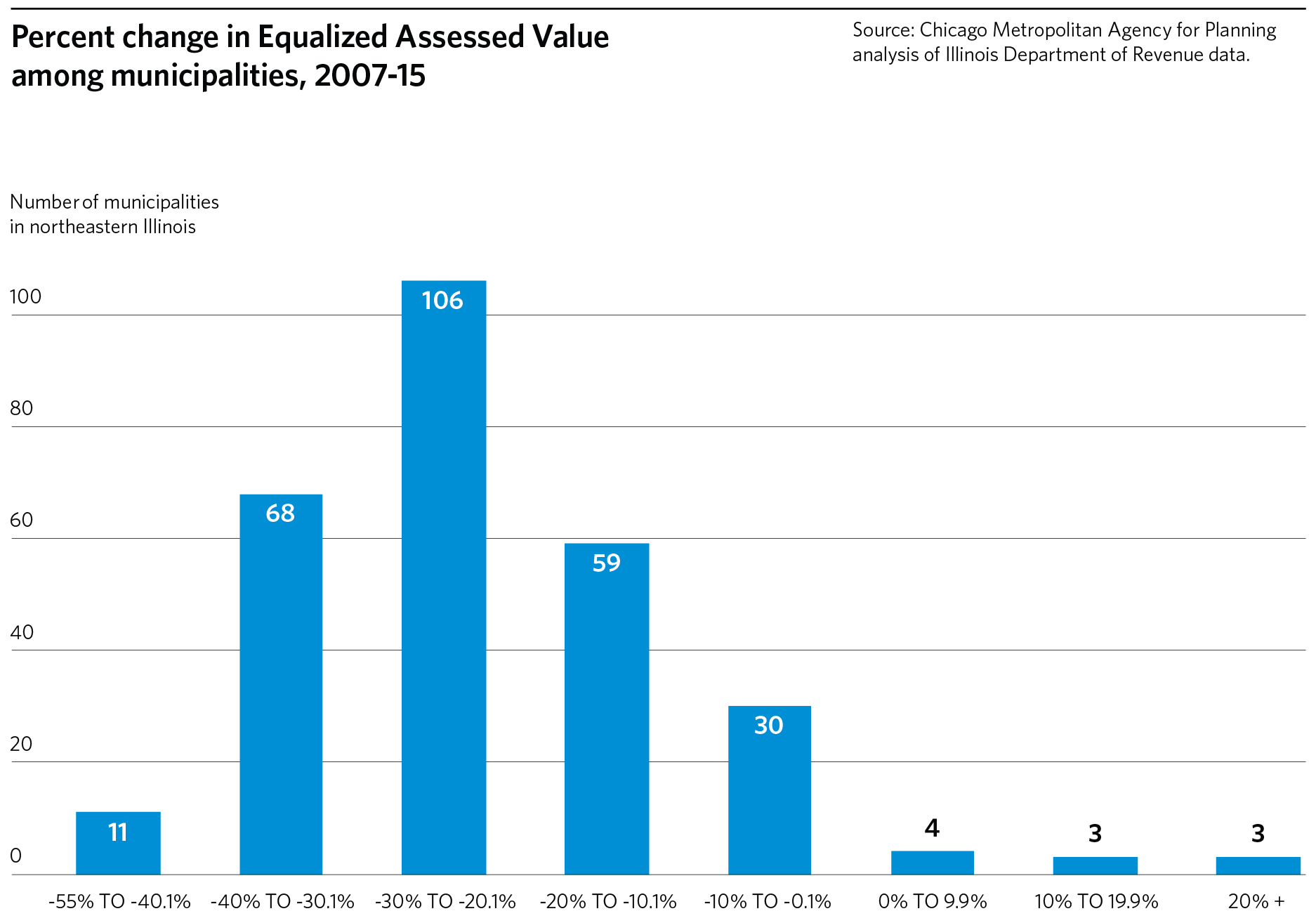Many Illinois municipalities are struggling to survive in today’s fiscal climate. A new paper outlines solutions.

Flickr user Josh Koonce (CC)
Pothole and sinkhole repair is an important responsibility of local governments, but financial pressures have made it difficult for many to keep up with their needs.
Part 1. The problem.
Municipalities are the building blocks of government in the Chicago region. There are 284 municipalities in northeastern Illinois, with broad responsibility for infrastructure and service provision, including many of the front-line services—like police protection and road maintenance—that residents and businesses count on most.
But nationwide, local governments face real challenges. Reduced funding from state and federal governments has forced municipalities to rely more heavily on locally generated revenue—particularly in Illinois, with fiscal problems among the nation’s worst. Compounding this, the Chicago region has suffered a very slow recovery from the recession a decade ago. Most municipalities have lower tax bases today than they did in 2007, forcing them to charge higher tax rates just to remain solvent.
Source: CMAP's ONTO 2050 Report

Source: CMAP and MPC's Municipal Capacity strategy paper
Where does this leave local governments? Some—those with highly experienced staff and elected officials, solid tax bases, and stable financial conditions—can adapt, raise revenue, cut costs and continue to offer good services to their residents. But not every community has these characteristics. Many municipalities do not have the resources to achieve their goals, and face increasingly difficult barriers.
Part 2. Solutions.
In fall 2017, MPC and Chicago Metropolitan Agency for Planning (CMAP) released a strategy paper on municipal capacity. This joint paper, prepared with funding support from The Chicago Community Trust, describes the problem and lays out potential solutions.
Through focus groups with elected officials and staff, and with support from a diverse advisory group, CMAP and MPC compared needs and barriers in areas such as training, service sharing, revenue base and planning practice. Research on existing best practices, both locally and nationwide, identified viable recommendations to improve municipal capacity. Recognizing the diverse characteristics and goals of jurisdictions, the paper offers strategies that can be tailored to meet each municipality’s needs, rather than one-size-fits-all actions. Recommendations fall into the categories of technical assistance, training, service sharing and consolidation, with particular attention to infrastructure and fiscal conditions. The paper also calls for new partnerships, recognizing the many actors involved in building effective government, including local governments, counties, councils of government, CMAP, civic organizations and the state.
Expertise building
Staff, elected officials, appointed officials and citizens are all involved in local government decisions. Some are highly trained in municipal operations and well-supported by existing professional organizations. But others, such as newly elected or appointed officials, or municipal staff forced by budget constraints to work outside their area of expertise, need opportunities to learn about fundamentals and best practices—and need these opportunities to be efficient, recognizing limited time availability. Expertise building strategies call for targeted professional development opportunities for staff and trainings for elected officials, among a wide array of technical assistance and training options.
Network building
Many success stories in building local capacity depend upon municipalities forging trusting relationships with each other. Connections between neighboring communities can lead to joint solutions, but those networks do not simply come into being. Successful networks require maintenance, with varying levels of formality. Recommendations for network building call for consistent and useful forums for communities to discuss common challenges and shared needs, mentoring relationships for new staff or elected officials, and online tools to prompt new partnerships.
Capability building
The right tools, fiscal resources, and human resources are critical to meet objectives. However, that does not mean that every community needs additional staff to effect change. Staff assistance from an outside group, staff and service sharing between communities and consolidation of services or even whole units of government are all legitimate options. Capability building recommendations focus on creative, effective solutions to build people power.
Part 3. Action.
A key purpose of the municipal capacity strategy paper is to inform ON TO 2050, the region’s next comprehensive plan, due to be released by CMAP in October 2018. The ON TO 2050 Preview Report indicates CMAP’s intent to emphasize municipal capacity in the plan, specifically supporting expansion of the Local Technical Assistance (LTA) program, additional trainings and technical assistance, collaboration across jurisdictions and service sharing.
The release of the strategy paper also signals a new commitment by MPC to address and help solve problems of municipal capacity. MPC has been actively involved in efficient government efforts for years, including Transform Illinois and collaborative approaches to housing and code enforcement. In 2018, MPC will devote new resources and leadership to the issue.
Perhaps this is a good time for an introduction, as this will be my main role at MPC in the coming year. I served as CMAP’s planning director for the past ten years, conceptualizing and then leading its LTA program, and I worked with municipal governments for five years before that. Through this time, I have been continually struck by the commitment and dedication of local mayors, trustees, commissioners and staff—but also by the severe lack of resources that constrains what they can accomplish. I’m excited to tackle this problem head-on.
MPC is a perfect organization to take a leadership role. MPC’s unique position at the intersection of the public, private, and civic sectors—with committee members and external advisors who offer expertise in engineering, law, finance and public policy—provides the breadth of perspectives and connections that this complicated topic requires. Add to this a staff that includes two former mayors, as well as strong connections to key partners like CMAP and the Metropolitan Mayors Caucus, and the potential of this effort becomes clear.
I look forward to diving into this topic more deeply in the coming year, and invite anyone interested to contact me.